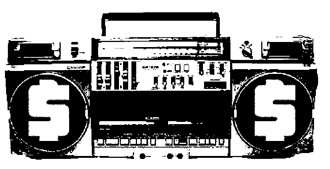| Illustration by Chuck Kerr |
Consider that Sub Pop, even with Nirvana’s Bleach in its catalog, never previously charted higher than No. 79, and Merge never even cracked Billboard’s Top 200 prior to the release of Arcade Fire’s 2004 debut album, Funeral.
If the music industry’s tectonic plates are shifting, however, you won’t find much evidence of it on commercial rock radio, where Chris Daughtry and Nickelback rule like a sadistic military junta. This kind of sales/airplay disconnect is bewildering, a bit like finding your country stuck in an endless, bloody Middle East quagmire when all the media pundits would prefer to discuss Larry Birkhead’s semen.
The reasons for radio’s resistance to independent music are numerous: laziness, knee-jerk conservatism, a tendency to equate small labels with musical inferiority, and, most crucially, the fact that over the last 40 years, FM radio programming slipped out of the control of actual music fans, and into the hands of careerist bean counters.
That last development set the stage for a modern-day payola scandal in which major-label employees were caught offering massive bribes to radio programmers (in the form of cash, iPods, video games, lavish vacations, and other obscene payouts) in exchange for putting Jennifer Lopez, Switchfoot, Good Charlotte, and others into regular rotation. (You didn’t think that real human beings were requesting those stinky J-Lo, Switchfoot, and Good Charlotte records, did you?)
The investigation, launched in 2005 by then-New York Attorney General Eliot Spitzer, culminated two weeks ago, with an unprecedented agreement by four radio conglomerates to pay the Federal Communications Commission $12.5 million in fines and devote a total of 8,400 half-hour segments to independent and local music. The four radio chains — Clear Channel, CBS Radio, Entercom Communications, and Citadel Broadcasting — didn’t confess to payola infractions, but they didn’t call any press conferences to offer adamant denials, either.
The particulars of the deal leave plenty of wiggle room for individual stations. Peter Gordon, who, on behalf of the American Association of Independent Music, helped the FCC broker the agreement, says radio stations will conform to the plan based on the size and demographics of their markets.
“They’re not all appropriate for it,” Gordon says. “You don’t want to go where you’re not wanted. It’ll be at select stations in the right markets, and we’ll be working with the radio chains to make sure that they follow through.”
Critics will rightfully complain that the agreement is the equivalent of applying a Band-Aid to a brain hemorrhage, that it’s a mere token gesture in the face of deep, systemic problems. But token gestures are preferable to indifference, and indifference is what indies generally get from commercial radio.
“We’ve tended to be relegated to the indie ghetto,” Gordon says. “We’ve been stuck in the shadows. So we needed a formal agreement to have a chance of changing things. It’s just a first step. It’s not the solution, it’s a pathway to the solution. It’s a way for us to get on the radio and show them that we won’t bring them any harm.”
Gordon hesitates to blame payola for commercial radio’s tendency to shut out indie artists, focusing instead on a vicious circle of antipathy that’s only rarely broken.
“It’s kind of a self-fulfilling prophecy: You can’t get on the radio, so you don’t try to get on the radio. And we haven’t had the resources to promote our music the way the bigger labels have,” he says.
Local Clear Channel representatives did not respond to the Current’s interview requests, but San Antonio seems unlikely to be among the markets impacted by the new FCC deal. Clear Channel owns seven stations in this market, but two of them are talk-oriented, two play R&B oldies, one plays easy-listening pop, one plays Top 40 pop, and one plays modern country. Wedging some Boxcar Satan between Carrie Underwood and Kenny Chesney does not appear to be in the cards.
Nonetheless, if you see this as a tentative thaw in a cold war, as the first awkward detente handshake between Nixon and Brezhnev, it might lead to a time when commercial, terrestrial radio represents something more than that horrible relic people listened to before mp3s, iPods, satellite radio, internet radio, and digital-music services rescued them from the Stone Age.
“It’s a good-faith gesture,” Gordon says. “There’s no magic bullet to correct past sins. All this does is say, ‘Let’s do a restart. Let’s forget about the past.’”


